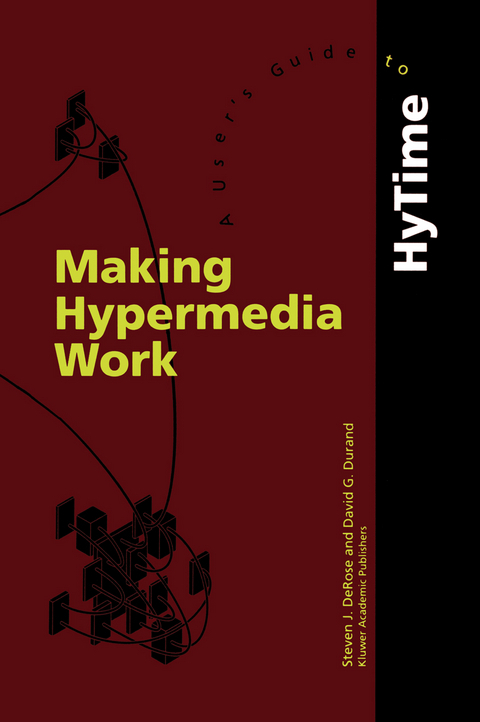
Making Hypermedia Work
A User’s Guide to HyTime
Seiten
1994
|
1994 ed.
Springer (Verlag)
978-0-7923-9432-7 (ISBN)
Springer (Verlag)
978-0-7923-9432-7 (ISBN)
Making Hypermedia Work: A User's Guide to HyTime discusses how the HyTime standard can be applied to real world problems of navigating from here to there in collections of documents. The HyTime standard itself provides enabling method and templates for various information structures such as links and various kinds of location indicators. A HyTime application specifies how a group applies those templates to their particular requirements. This involves choosing which HyTime structures are needed, setting up conventions for how they are to be used and setting up management and processes for creation, conversion and update of hypermedia documents. A HyTime engine is the last ingredient: actually using an application typically involves choosing software to support one's use of HyTime and customizing it as needed. This may be as simple as setting up hypertextual style sheets that determine how links and other things look and act. More specialized applications may require full-scale design and programming.
Making Hypermedia Work: A User's Guide to HyTime presents the first in-depth guide to the HyTime specifications, both describing its key features and providing guidelines on how it is used. The book begins with the more familiar structures of books, graphics and cross-references, detailing the HyTime constructs and models used to identify, locate, and link data. It goes on to introduce some of HyTime's mechanisms for linking multidimensional, multimedia data, and for scheduling it in space and time. The authors help the reader become fluent in HyTime as it applies to the simpler and most widely understood data types. After mastering this level of HyTime, readers will be ready and able to explore the exciting potential of HyTime for more sophisticated multimedia applications.
Making Hypermedia Work: A User's Guide to HyTime presents the first in-depth guide to the HyTime specifications, both describing its key features and providing guidelines on how it is used. The book begins with the more familiar structures of books, graphics and cross-references, detailing the HyTime constructs and models used to identify, locate, and link data. It goes on to introduce some of HyTime's mechanisms for linking multidimensional, multimedia data, and for scheduling it in space and time. The authors help the reader become fluent in HyTime as it applies to the simpler and most widely understood data types. After mastering this level of HyTime, readers will be ready and able to explore the exciting potential of HyTime for more sophisticated multimedia applications.
I.- 1 Introduction.- 2 Hypermedia Concepts.- 3 Overview of SGML.- 4 HyTime Quick start.- 5 The Structure of HyTime.- II.- 6 Basic Measurement.- 7 Hyperlinks.- 8 Locating Data Objects.- 9 The HyTime Query Language.- 10 Modifying a DTD for HyTime.- III.- 11 Lexical Types and Properties.- 12 Extending HyTime.- 13 Advanced Measurement and Scheduling.- 14 The HyTime Base Module.
| Erscheint lt. Verlag | 30.6.1994 |
|---|---|
| Zusatzinfo | XXII, 384 p. |
| Verlagsort | Dordrecht |
| Sprache | englisch |
| Maße | 170 x 244 mm |
| Themenwelt | Informatik ► Theorie / Studium ► Künstliche Intelligenz / Robotik |
| Mathematik / Informatik ► Informatik ► Web / Internet | |
| Technik | |
| ISBN-10 | 0-7923-9432-1 / 0792394321 |
| ISBN-13 | 978-0-7923-9432-7 / 9780792394327 |
| Zustand | Neuware |
| Informationen gemäß Produktsicherheitsverordnung (GPSR) | |
| Haben Sie eine Frage zum Produkt? |
Mehr entdecken
aus dem Bereich
aus dem Bereich
Buch | Softcover (2024)
REDLINE (Verlag)
CHF 27,95
Eine kurze Geschichte der Informationsnetzwerke von der Steinzeit bis …
Buch | Hardcover (2024)
Penguin (Verlag)
CHF 39,20


